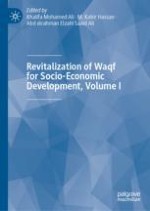2019 | OriginalPaper | Buchkapitel
8. Cash Waqf Deposit Product: An Innovative Instrument of Islamic Banks for Socio-Economic Development in Bangladesh
verfasst von : M. Mizanur Rahman, M. Nurul Islam Sohel
Erschienen in: Revitalization of Waqf for Socio-Economic Development, Volume I
Aktivieren Sie unsere intelligente Suche, um passende Fachinhalte oder Patente zu finden.
Wählen Sie Textabschnitte aus um mit Künstlicher Intelligenz passenden Patente zu finden. powered by
Markieren Sie Textabschnitte, um KI-gestützt weitere passende Inhalte zu finden. powered by
